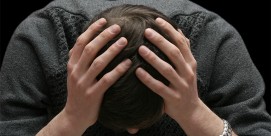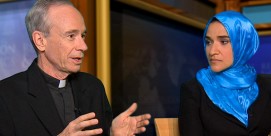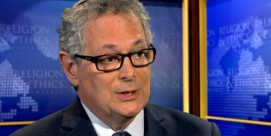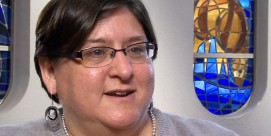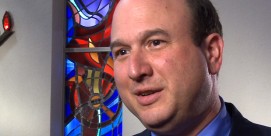In This Episode << SLIDE LEFT TO SEE ADDITIONAL SEGMENTS
Religious Response to America’s Tragedy
BOB ABERNETHY, anchor: The grieving for the thousands killed in Tuesday’s attacks comes on the eve of the Jewish High Holidays — Rosh Hashanah, beginning this Monday night, and Yom Kippur, beginning at sundown a week from Wednesday. It’s a time of repentance and asking forgiveness from God and each other for wrongs done during the past year, wrongs Jews ask to be wiped away on Yom Kippur, the Day of Atonement.
Questions of justice and forgiveness, revenge and retribution are just some of the difficult theological and moral issues raised by last Tuesday’s terrorism, and we want to explore them now with four religious leaders and scholars.
Rabbi Jack Moline leads the Agudas Achim Congregation of Conservative Jews in Alexandria, Virginia.
Dr. Akbar Ahmed is the chair of Islamic studies at the American University in Washington.
Dr. Scott Appleby is a professor of history at the University of Notre Dame. He joins us from Chicago.
And the Rev Dr Thomas Long is professor of preaching at the Candler School of Theology at Emory University in Atlanta. Welcome to all of you.
Dr. Long, let’s begin with some of the pastoral questions. When terrorists killed thousands of innocent people, where was God?
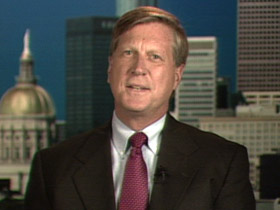
REV. DR. THOMAS LONG (Candler School of Theology, Emory University): Well, we must be very modest about saying where God was and what God was doing in any event of such a catastrophe as this. We do know some things, though, and that is that wherever there is suffering and the cry of suffering people, we know that God hears that cry and participates in that suffering. And we know that God is in the midst of the suffering working for good. We know this from the scriptural traditions.
ABERNETHY: What do you think an event like Tuesday’s terrorism does to people’s religious faith?
DR. LONG: I think it has both a negative and positive effect. For some people, it is such a shaking event their faith in God is called into question. But for most people, even people who have not thought of themselves as conventionally religious, this kind of event puts them to the basic questions and recalls them to a rekindled faith in a trusting God.
ABERNETHY: Rabbi Moline, the question “Where is God in the midst of suffering?” is a familiar one to Jews, especially after the Holocaust. Can anyone blame God for all that is evil?
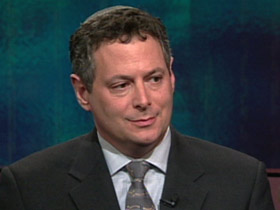
RABBI JACK MOLINE (Agudas Achim Congregation): Blame is a question that troubles us as human beings, I think more, than, it is a theological concern for us. It’s important to hold God accountable for the world that God created and in which we live. But it is far more important for us to take responsibility for our own actions — whether we meet the potential with which we’ve been endowed.
ABERNETHY: Dr. Ahmed, as we conduct this conversation we don’t know yet exactly who was responsible for the attacks, but many signs point to Islamic fundamentalists. How could anyone in the name of Islam take so many innocent lives?
DR. AKBAR AHMED (Islamic Studies, American University): Well, first of all it is important that we clarify what Islam says about this kind of action. The Koran specifically states that the taking of one individual life is the taking of the lives of entire humanity. It totally condemns this kind of killing of innocent women, children, civilians, so that is the Islamic position. Muslim organizations in America have all condemned what took place. So it is not really an Islamic action; it is the action perhaps of some Muslims, and we need to try to put that in context.
ABERNETHY: But isn’t it true that, perhaps by misunderstanding the Koran, but isn’t it true that Islamic terrorists see the United States as an enemy?
DR. AHMED: Yes, some of them do.
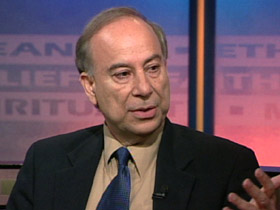
ABERNETHY: Feel that they need to harm us, in the name of protecting their religion and that they will be martyrs if they do that?
DR. AHMED: Absolutely right. There’s a lot going on in the Muslim world. Remember, we are talking about a civilization of over a billion people — 55 states in various states of development, various positions on the trajectory of development. And the result is that many of them are very frustrated at the change, at the transformations — many of them identify the United States for many of the problems that they face.
ABERNETHY: Do the majority of Muslims and the leaders of the majority of Muslims have a responsibility to speak out all over the world and condemn what happened?
DR. AHMED: I think most of them did. I think, certainly, I heard King Abdulluah of Jordan, I’ve heard the president of Pakistan, I’ve heard the Saudis; they have very strongly condemned what took place because that cannot be justified on any Islamic or theological ground.
ABERNETHY: Dr. Appleby in Chicago, you’ve written extensively about religious fundamentalism, including Islamic fundamentalists. What do we need to know about what’s driving Muslim terrorists?
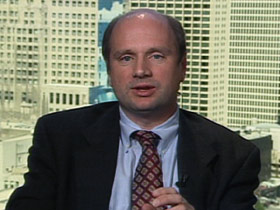
DR. SCOTT APPLEBY (History Professor, University of Notre Dame): There are three things driving Muslim terrorists. First of all, the state of Israel and the perception that Israel is a surrogate of the United States — a kind of beachhead in the Middle East — so that United States interests can be served though Israel. Those interests are oil, primarily. Sometimes, the rhetoric goes the other way, that the United States is a dupe of Israel, but there’s that spearhead of encroachment. The second issue is a perceived hypocrisy on the part of the United States and its foreign policy. We are the great advocate of democratization, freedom, liberalism, and yet the Islamists see us propping up with regimes like that in Egypt, which are not democratic, and even worse, in Algeria in which there were democratic elections almost a decade ago that were overturned and we were silent about it. You can go around the Middle East and see signs of what is perceived as American hypocrisy because, the Islamists would say, the people are not able to speak. The people are Islamic, want to be governed by Islamic law, and the United States supports corrupt regimes. Finally, the underlying cultural problem, though, in both of these situations, is what one Iranian intellectual called “Westoxication” — being intoxicated by Western lifestyle, both drunk by it and also poisoned by it. So the pervasiveness of Western culture which is a threat to Islamic ways of life, to traditional ways of life around the world.
ABERNETHY: But what does that mean then for what we should do in the way of response? Let’s move this now to what we should do in the way of response. What do the religious traditions have to say about it? What does the just war tradition within Christianity have to say about it?
DR. APPLEBY: Well, the just war tradition would say that there can be no kind of retaliation that is not strictly defensive and limits the casualties to combatants. And the jihad tradition as well would impose similar restrictions on any kind of use of violence. The difficulty with invoking either the Christian just war tradition theory or theories of jihad is that the combatants of today would say the circumstances in today’s world don’t fit neatly into those categories. How do you discriminate among combatants and noncombatants? How do you limit the casualties? And what constitutes a defensive action?
ABERNETHY: Tom Long in Atlanta, what does your Protestant tradition have to say that would be helpful to those deciding what the United States should do now?
REV. DR. LONG: Well, the Protestant tradition would call us to recognize that all humans are created in the image of God, even those who commit acts of terrorism, and while condemning the act of terrorism we must not demonize any class of people or group of people who did this. We are also taught that we ourselves were enemies, enemies of God, and the cross is God’s answer to our active opposition to God’s will. So we are joined in a solidarity with those who have committed violence. We ourselves have done it.
ABERNETHY: Do you feel that that could go as far as to be forgiving?
REV. DR. LONG: Yes, I think it does. I think that we are hoping for justice in this situation, but we should always treat those who have committed the acts of violence as fellow human beings, and we should seek to love our enemies.
ABERNETHY: Rabbi Moline, want to get in on that?
RABBI MOLINE: I think there is a very strong dividing line between Christian theology and Jewish theology. For us to consider forgiveness without contrition first, I think, is obscene. The acts that were perpetrated here were willful acts of evil. For us to forgive without an expression of contrition from those who were in any way responsible is akin to putting a target on the tallest buildings in the United States.
ABERNETHY: Dr. Ahmed, what would the Islamic tradition have to say about what would be an appropriate American military response to what happened?
DR. AHMED: That’s a very important question. We need to identify the perpetrators, the people who committed this crime. I agree with the rabbi that the scale of this crime is so huge. At the same time, we need to be careful not to identify the entire Islamic civilization as the people behind this crime. Don’t forget there are millions of Muslims living in America who are horrified by what happened. Don’t forget that thousands of Muslims died in the twin centers. In fact, one of my relatives rang up his father just minutes before the center collapsed and he said, “Don’t worry, I’m alright. I’m seeing the first center collapsing, and it will be alright.” That is the last we heard of him. Now like me, he is a Pakistani-background citizen, but a citizen of America living here. So there are many, many Muslims involved in exactly the suffering that other people are going through.
ABERNETHY: So what do all of you think of the idea that those who harbor or help terrorists, wherever they are, should be targets as well as the terrorists themselves?
DR. AHMED: I think that the world that has opened up now this new chapter in world history, I really see this as a defining moment not just in American history, but in world history. I think this threat of terrorism will become a very serious, a very real threat. And I believe that we need to be able to combat that in the future in a very effective way.
DR. APPLEBY: In terms of the U.S. response, what I’d like to see and the world I’d like to see, the military retaliation may well be in place, but it would be couched within a much broader and wiser set of policies on the part of the United States. I would love to see a larger percentage of our defense budget go to promoting civil society, democratization working hand in hand with the people who oppose us, especially the people on the outer fringes who wouldn’t ordinarily oppose us, but the problem with the kind of targeted military retaliation which we’re going to see, there’s no doubt about it, but the problem is that it’s like a hydra head: you cut off one head, and three more grow back. That is, there are substantive structural issues here. There are issues of justice. Yes, we do have some enemies that are, we can use words like evil, we can use the language of ethics, there’s no question about that, but they wouldn’t have any support whatsoever, and they do have some support, if there weren’t structural issues of justice underlying their claims. A sense of grievance, a sense that they’ve been denied rights and privileges and that so much of the resources of the world go to a relatively few number of the small percentage of the people of the world.
ABERNETHY: Dr. Ahmed, while you’re here, let me ask you this. The government of Pakistan, which you know well, you’re a citizen of Pakistan, you’re a former Pakistani diplomat, may well have a very difficult choice to make here. We want them to do everything possible to stop terrorism next door to them in Afghanistan. If they do that, they offend a lot of terrorist sympathizers in Pakistan, so what should they do?
DR. AHMED: Very difficult situation for Pakistan, and they have to really decide which way they’re going. Because if they’re going to create a civil society, a democratic society for the future, they have to also make some hard decisions. Don’t forget that Pakistan itself is going through a crisis. The old structures are collapsing, social structures, economic structures, political structures. And it is a very volatile region of the world. And it is an important region of the world — 145 million people and a nuclear power.
ABERNETHY: But do you feel they have to change course and help the United States?
DR. AHMED: Absolutely, they have to make a very clear choice and come in either helping the U.S., and saying we stand shoulder to shoulder with you — this is a terrible act. Not just verbal sympathy but practical sympathy or then forsake the possibility of being an ally with the Americans.
ABERNETHY: I want to get back to the pastoral role here with which we started. Tom Long, what do you say to people who are filled with rage and want to strike out right now, immediately? How would you counsel, for instance, a friend of mine who said this week, “I want to kill someone”?
REV. DR. LONG: I think there is a sense in which we all feel that. It’s a very human thing to want to strike back, to feel revenge, to want retaliation. I think we don’t have to act out of those feelings. I think we own those feelings, but we don’t have to act out of them, that we are called to repay no one evil for evil, so I would say to your friend, “We all feel that way. Your humanity calls you to act out of another set of principles.”
ABERNETHY: Rabbi Moline?
RABBI MOLINE: I think it’s important to distinguish between pastoral care and good theology here. I would concur that people’s feelings of anger — I share those feelings of anger — need to be acknowledged, but that we have to be cautioned, that our religious traditions are strong because they have been tested over time. Our reactions are short-termed and temporal, and the best thing right now is to turn back to our traditions for their guidance rather than to act out of any kind of internal impulse.
ABERNETHY: That would be very hard to restrain very, very forceful action.
RABBI MOLINE: That’s why we are a community instead of a collection of individuals.
ABERNETHY: Tom Long, you were talking about forgiveness earlier. Very quickly, does this idea of forgiveness, does that apply to nations or just to individuals?
REV. DR. LONG: I think it applies to nations as well. I think forgiveness is more than just a one-to-one thing. But I also would want to caution myself and others that forgiveness is not easily gained, that this is a process. That we have to go through feelings of outrage before we can arrive at forgiveness. But it is something we forgive peoples as well as individual persons.
ABERNETHY: Very quickly, Scott Appleby in Chicago, do you have anything to add here about how we should proceed now?
DR. APPLEBY: I don’t know if I’d use the word forgiveness, but I think it’s in our own interest as a nation to respond in a more nuanced and flexible way, because there are, as I have suggested, very real problems about the spread of democracy, the sharing of resources on the planet, and questions of simple justice that, among other things, this terrible incident should cause us to reflect. This is not to encourage such incidents anyway, but cause us to reflect upon the root causes of it.
ABERNETHY: Our time is up. Our thanks to Rabbi Jack Moline and Professor Akbar Ahmed here in Washington, to Dr. Scott Appleby in Chicago, and to Reverend and Professor Thomas Long in Atlanta.

